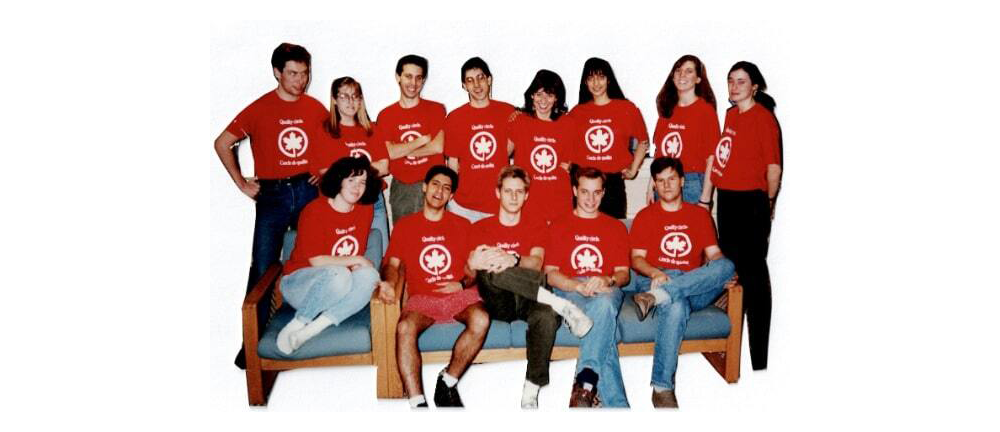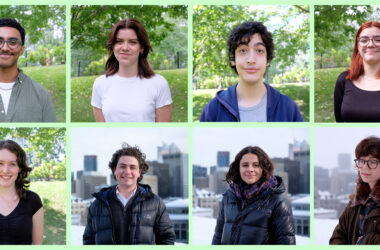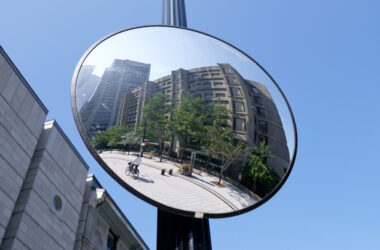McGill University welcomes more than 6,000 undergraduate students to its downtown and Macdonald campuses every year. To promote student well-being amidst the high demand of academic degrees, the university stresses the importance of maintaining an active and well-balanced social life. Student-based organizations, such as the Students’ Society of McGill University (SSMU), the Arts Undergraduate Society (AUS), and the Engineering Undergraduate Society (EUS), have encouraged these ideas through various social, personal, and cultural activities for generations. But a lot has changed when it comes to social engagement over the years at McGill. To obtain a multi-generational perspective, I met with Ken Wright (BComm ’55, who also happens to be my grandfather), Alexandra Clark (BA ‘92), Rhiannon Turgel (BA ‘16), and Amélie Barsoum (BEng ‘23) to find out what social life looked like during their time at McGill.
Some of the most popular and meaningful forms of social life on campus are clubs and student groups, and many of McGill’s 250 clubs have been operating for decades. For Clark, the McGill Debating Union was a dominant part of her social life. She joined the club during her freshman year in 1988-1989 and spent the greater part of her four-year undergraduate degree hanging out with them.
“It was a big commitment, involving club meetings and debating competitions that happened off-campus,” Clark said. “What kept me in the club was the community of people I met through it: An incredibly diverse, challenging, fun, and outgoing group of people.”
Some students come to McGill with the advantage of already having a circle of friends. Rhiannon Turgel, who went to CEGEP before attending McGill, told me that she wanted to build a community beyond her existing connections. In her case, she actively participated in multiple events hosted by different clubs without formally joining them.
“At the end of my first year, I realized that I wanted a McGill community beyond [what I had at CEGEP],” Turgel said. “That’s when I started participating in all of these events: The McGill Athletics ‘hype team’, pub crawls with out-of-province and international students, Model UN, as well as the HSA [History Students’ Association].”
At the start of 2020, the pandemic transformed what social opportunities looked like for students at McGill. Club involvement was limited, as were in-person encounters. Amélie Barsoum, who began her bachelor’s degree that same year, had to navigate this highly challenging social and learning environment.
“When COVID-19 restrictions started lifting, I joined P.O.W.E. [Providing Opportunities for Women in Engineering] so I could have a sense of belonging with the engineering community at McGill,” she shared. “I’m also very passionate about the mission of P.O.W.E., as I’m a woman in engineering myself.”
She emphasized that socializing during COVID-19 was incredibly challenging for off-campus students.
“I definitely think that those who spent their first year in residence, and who were made aware of a broader range of school activities as a result, have a huge advantage over those who didn’t,” Barsoum said. “This has improved since the lifting of COVID-19 measures, but I still feel behind compared to some of my peers.”
McGill’s active Greek life, composed of fraternities and sororities, often represents a large part of the community-building aspects of student life. Frats and sororities plan and host events for their members, which are often, but not always, open to the McGill community at large. Most of McGill’s frats and sororities are among some of McGill’s oldest student groups, dating back to the late 1850s. In an interview with The McGill Tribune, Wright shared his experience with McGill’s Alpha Delta Phi during his undergraduate degree in the 1950s.
“Fraternities, back then, were very popular,” he said. “At McGill, they were the centre of your social life. Fraternities were very involved in student life on campus, and its members planned and organized many winter events, such as the McGill Winter Carnival.”
This annual event formerly took place around February. It included a series of winter-themed activities such as hockey games, ice sculpting, the crowning of a Carnival Queen and a spectacular closing event: The Carnival Ball.
Despite being a widespread social and cultural phenomenon in universities across North America for over a century, social perceptions of Greek Life organizations have now shifted.
“Fraternities aren’t as big of a deal now,” Wright added. “I probably wouldn’t join one today, but back then, they were the driving force of all student activities on campus.”
Ironically, a culture of selectivity and prejudice, including purposeful exclusion, hazing, and sexual misconduct often surrounds these groups, which are intended to promote values of familyhood and togetherness, Wright explained. “Those aren’t features we admire as individuals and organizations.”
Student clubs as we know them today, however, work to form connections with others, as they bring together like-minded students from a range of backgrounds with common interests. In some cases, fellow club members can lead to lifelong friends. Clark, who now works as a lawyer and litigator in the Toronto area, shared that many people within the Debating Union still keep in touch.
“I continue to cross paths with people from that time, many of whom I am still friends with today,” she said.
Sometimes, joining a club can lead to meeting a handful of people who are important connections. But this isn’t always the case.
“Clubs have a reputation of being a place where you meet your closest friends, which isn’t always true,” Barsoum said. “In my case, clubs have given me a network of acquaintances, potential roommates and people I could participate in events with, which allowed me to expand my network of connections within my faculty and department.”
Interviewees also reflected on their student experience in Montreal beyond the walls of the University Centre. Despite becoming increasingly expensive to newcomers, Montreal’s city life has remained vibrant and diverse over the years, which students and alums reflect back on fondly.
“I loved being an out-of-province student at McGill,” Clark recalled. “There was always something to do or see to distract you when academic life became too much. In general, McGill—and Montreal—made it an easy transition for someone who hadn’t seen a lot of life.”
McGill’s location in the heart of downtown Montreal stimulates the possibility for new connections.
“Being on campus downtown was great,” Turgel said. “We were close to public transit and streets filled with bars, coffee shops, and stores. Everything you needed was there.”
Well known for their work-hard-play-hard ethic, McGill students take the play-hard part seriously. On weekend evenings, the city’s streets fill with students roaming to and from parties and clubs, enjoying a well-deserved break after a week of classes. The partying scene, however, varies between faculties and, of course, between generations.
“I would describe the partying scene at McGill as being very organized,” Amélie Barsoum (BEng ‘23) said. “In engineering, a lot of the partying happens at organized events, which are inclusive to McGill’s entire student body. Although [they are] accessible, these events can vary in affordability.”
McGill’s nightlife involves events for all tastes: Events centred around drinking, like “bar crawls” and wine-and-cheese soirées or “dry events,” like coffee houses, where drinking is limited and the evening focuses on other activities.
“The event selection is very diverse,” Barsoum added. “Many new events pop up yearly, whereas others are annual.”
Regardless of the event type, these environments are, for the most part, respectful of their attendees.
“I found events to be very inclusive: As I wasn’t a big drinker, I would often participate in games and activities with water and never felt pressured to drink,” Turgel said.
Engagement in McGill’s student life activities across time suggests that, despite generational differences, McGill’s social life remains a flourishing environment for undergraduate students. Although the reality of a post-pandemic, digital era challenges the in-person interconnectedness of some of McGill’s original social activities, hopes are that current and future McGill students will continue to forge their own social paths.









